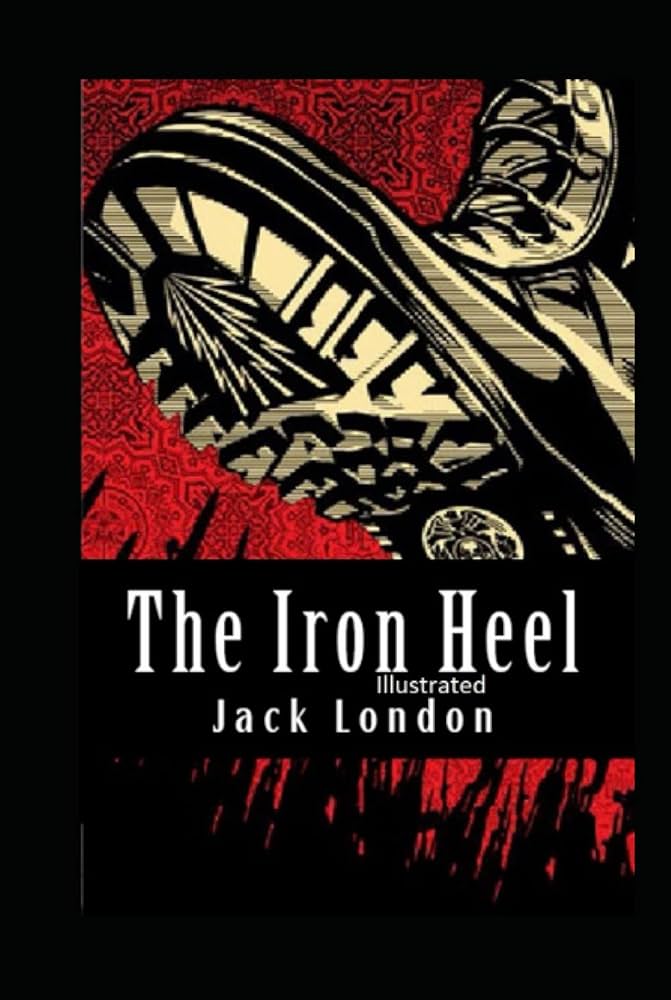Note: If you wish to receive, via e-mail, (1) my weekly newsletter or (2) daily copies of these posts, write to me at rrbates1951@gmail.com. Comments may also be sent to this address. I promise not to share your e-mail with anyone. To unsubscribe, write here as well.
Friday
Over at the website Literary Hub, author Ken McGoogan describes Jack London’s 1908 novel The Iron Heel as “one of the most prescient dystopian works ever written.” In it he describes how the governing party, even after losing an election, refuses to leave office:
The incumbents refused to get out. It was very simple. They merely charged illegality in the elections and wrapped up the whole situation in the interminable red tape of the law. The Democrats were powerless. The courts were in the hands of their enemies.
McGoogan then admits to having changed the word “Democrats”—in the novel it appears as “Grangers”—but the rest of the passage is quoted verbatim.
News of the book is especially timely given Special Counsel Jack Smith’s recently released indictment–updated in light of the U.S. Supreme Court’s recent presidential immunity decision–which lays out in more detail than we’ve previously seen the the many different ways Donald Trump attempted to remain in power. By immunizing Trump for all “official acts,” the Supreme Court forced Smith to limit his case to “unofficial acts.” While overthrowing the government shouldn’t be regarded as an official act, the Supreme Court will make the final determination, and it has been, if not in Trump’s hands, then at least leaning heavily in his favor.
For the record, here’s an excerpt from Smith’s charges:
When the defendant lost the 2020 presidential election, he resorted to crimes to try to stay in office. With private co-conspirators, the defendant launched a series of increasingly desperate plans to overturn the legitimate election results in seven states that he had lost—Arizona, Georgia, Michigan, Nevada, New Mexico, Pennsylvania, and Wisconsin (the “targeted states”). … The through-line of these efforts was deceit: the defendant’s and co-conspirators’ knowingly false claims of election fraud.
McGoogan provides the following summary of London’s novel:
The story covers the period from 1912 to 1932 and treats the evolution of the powerful “Oligarchs” in the US into the ruling dictatorship of the Iron Heel. The Oligarchy comprises a few massive and growing “trusts” run by individuals who have become obscenely rich and powerful by squeezing small and middle-sized businesses into capitulation. The contemporary reader cannot help but think of the top 1 percent of Americans, billionaires said to control 40 percent of the nation’s wealth—though some say that figure is much higher.
McGoogan points out that the novel appeared three decades before Upton Sinclair’s It Can’t Happen Here, which lays out a similar scenario, and he observes that George Orwell was a fan. As Orwell saw it, Iron Heel is “a very remarkable prophecy of the rise of Fascism.” Whereas many socialists (Jack London was a socialist) used to believe that the working class would eventually displace the capitalist class, Orwell saw in London a hard-nosed realist who realized that the capitalist class would counterattack with maximum force before letting that happen. McGoogan notes that “neither London nor Orwell would be surprised to see Donald Trump and far-right Republicans manning the barricades for the billionaire class.”
We can only hope that London’s other prediction is wrong. Once the Oligarchy in The Iron Heel seizes power, it holds on to it for three centuries.
London’s insightfulness about rightwing brutality, Orwell added, comes from the fact that he himself was tough, having experienced the rigors of the fishing industry and the Alaska gold rush. “With his love of violence and physical strength, his belief in ‘natural aristocracy’, his animal-worship and exaltation of the primitive,” the British author wrote, “he had in him what one might fairly call a Fascist strain.”
In other words, he knew fascism when he saw it, having himself traveled to the dark side. Then he came back to warn us.
This article on London is excerpted from McGoogan’s Shadows of Tyranny: Defending Democracy in an Age of Dictatorship. According to the book’s description, in addition to London Shadows of Tyranny references Margaret Atwood, George Orwell, H.G. Wells, Yevgeny Zamyatin, Sinclair Lewis, and Philip Roth, all authors of dystopian novels envisioning democracy’s collapse. The last ten years, sadly, have given us ample reason to go back and read or reread their works.


